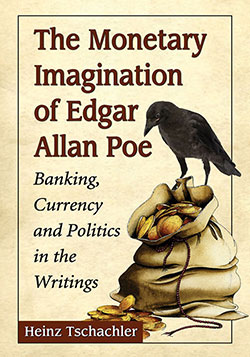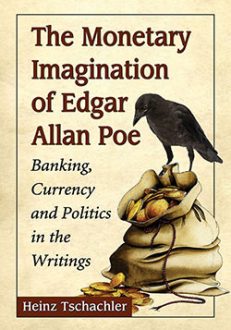The Monetary Imagination of Edgar Allan Poe
Banking, Currency and Politics in the Writings
Original price was: $39.95.$31.99Current price is: $31.99.
In stock
About the Book
In this first-of-its-kind treatment, Heinz Tschachler offers an account of Edgar Allan Poe’s relation to the world of banking and money in antebellum America. He contends that Poe gave the full force of his censure to the acrimonious debates about America’s money, Andrew Jackson’s bank war, the panic of 1837 and the ensuing depression, and the nation’s inability to furnish a “sound and uniform currency.” Poe’s attitude is overt in his early satires, more subdued in “The Gold-Bug,” and almost an undercurrent in writings that enter into and historicize the discovery of gold in California.
In Poe’s writings much is concealed, though his art also reveals while it conceals, in this instance, a deep felt desire for an authority that would guarantee a measure of permanence and continuity to the nation’ s currency. That kind of currency was finally furnished by Abraham Lincoln (both were born in 1809; Poe died in 1849), at one time a dedicated reader of Poe’s tales and sketches. Wielding his “power of regulation,” Lincoln came to save the Union not just militarily but also economically. Under him, the United States government finally provided the kind of “sound and uniform currency” that Poe in his writings could only name and rehearse.
About the Author(s)
Bibliographic Details
Heinz Tschachler
Format: softcover (7 x 10)
Pages: 230
Bibliographic Info: 26 photos, notes, index
Copyright Date: 2013
pISBN: 978-0-7864-7583-4
eISBN: 978-1-4766-0583-8
Imprint: McFarland
Table of Contents
Table of Contents
Acknowledgments ix
Preface 1
Prologue: “Y’all Don’t Know; But Poe Know” 7
1. Poe, the Critics and the Question of America’s Money 21
2. Captain Kidd’s Treasure and the Paper System: Questions of Trust 49
3. Capital Stories: Poe, the Banks and Politics 76
4. Poe’s Nightmares: Gold, Counterfeits and Literary Politics 109
5. Fables of Circulation: Poe, Civic Virtue and the “American System” 136
Epilogue: The National Currency and Methods in Madness 165
Chapter Notes 171
Bibliographic Essay 202
Index 211
Book Reviews & Awards
“provides a learned, impassioned, and, within the wider scholarship on Poe’s work, unorthodox, refreshing and inspiring study of a nineteenth-century U.S.-American author in his times”—Amerikastudien/American Studies.





